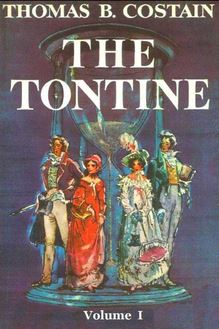The Tontine, Volume 1 , livre ebook
294
pages
English
Ebooks
2021
Vous pourrez modifier la taille du texte de cet ouvrage
Obtenez un accès à la bibliothèque pour le consulter en ligne En savoir plus
Découvre YouScribe et accède à tout notre catalogue !
Découvre YouScribe et accède à tout notre catalogue !
294
pages
English
Ebooks
2021
Vous pourrez modifier la taille du texte de cet ouvrage
Obtenez un accès à la bibliothèque pour le consulter en ligne En savoir plus
Publié par
Date de parution
23 novembre 2021
Nombre de lectures
2
EAN13
9781774644966
Langue
English
A tontine is a life insurance scheme, stratified by age. Enrollees received payouts after an initial growth period, the amounts determined by the number of living recipients. Over time, as participants died, the payouts became more and more substantial. Towards the end, when the recipients became a mere handful, all sorts of betting occurred in the general populace on who would be the last survivor.
Publié par
Date de parution
23 novembre 2021
EAN13
9781774644966
Langue
English
First published in 1955.
This edition published by Rare Treasures.
Trava2909@gmail.com
All rights reserved. No part of this book may be reproduced or transmitted in any form or by any means, electronic or mechanical, including photocopying, recording, or by any information storage or retrieval system, except in the case of excerpts by a reviewer, who may quote brief passages in a review.
The Tontine
VOLUME I
BOOK I A Very Bad Man Has a Very Good Idea
CHAPTER ONE
1
IT WAS in the year 1815 and the people of England were suffering fromstrange and unpredictable humors. The war against the French had beengoing on too long. A few months before, with Boney put away in Elba, ithad seemed that all the dangers and uncertainties, and the hardships theyhad endured so long, had come to an end. Trade would revive and theluxuries from which they had been cut off and which they had missed somuch would come back on the market. But the terrible Corsican had brokenout and his armies were marching again into the Low Countries.
Englishmen loved a “little go” above everything and they had turned tothe solace of gambling. The great ventures which had resulted in such unpleasantnessesas the South Sea Bubble were now prohibited by law and thestate lotteries had been stopped. But private lotteries were proceeding merrilyand all the men of England, and all the women too, were putting intheir weekly dibs. Every owner of an oyster stall in London had his ownlittle lottery and his customers not only got a plateful for threepence but achance for five guineas if they drew the lucky number. A share in a drawingrode on every helping of rare roast beef served in the eating houses. Themorocco men, who made the collections for bigger goes, took in half amillion pounds sterling every year from domestic servants alone.
All this would soon be over. Parliament would get through with Boneyand would come around to home problems again, and governmental broomswould begin on the gambling evil. But the tontines would keep right on,and this was natural enough. The tontine was a slow-moving affair and, onthe surface at least, it lacked the evil features of the lottery. Men andwomen who put their money in tontines had to live out a good span of yearsto share in the heavy distribution of money and only in the final stages wasthere excitement for the public to share. Moreover they were a form ofinsurance and, for those who were lucky or, more accurately, who werehealthy, they brought a fine income for the declining years. So the lawwould come down hard on the men who financed lotteries, and the pigeonsand rooks who ran them, and would as yet turn no more than a dubious eyeto the tontines.
It so happened, therefore, that on Sunday, June 18, 1815, a meeting washeld in the drawing room of a gloomy old mansion on Grosvenor Squarein London which the impecunious Duke of Outland had sold for a veryfine price to a husky-voiced and highly suspect individual named HarkChaffery. The latter was known to be a power in the shadowy reaches wheremen did not work but thrived on thievery and gambling and blackmail.Chaffery had come up from the kinchin lay, which was the lowest form oftheft, to a monarchy in easy money and he had called a meeting of hishenchmen to set into motion the greatest tontine the country had everknown.
This precious crew worked all day over the details and Chaffery himself,having a keen head on his puny, sloping shoulders, had proposed severalinnovations which delighted the shrewder of his men and were calculatedto set the country into a flurry of eager participation. They never gave asmuch as a thought to the possibility, nay, the certainty, that on this veryday the Duke of Wellington and his allied armies would face the dreadedNapoleon on a bloody battlefield close to the city of Brussels to which historywould give the name of Waterloo.
2
At ten o’clock on Tuesday, June 20, Samuel Carboy started to walk toCapel Court, wearing a frown which added to the severity of his normallystern countenance. He proceeded at a slow gait, although it was certain hewould be late for the opening, setting his feet down flatly and loudly asthough providing periods for the sentences of his orderly thought. He paidno attention to the excitement in the streets which was mounting everyminute and it might have been assumed that he was not going to the newStock Exchange after all, for he passed by Shorter’s Lane and turned intothe Hercules Tavern. This would have been a miscalculation, however, forthe men who built the new Exchange had provided quietly an extra entrancethrough this orderly and rather famous eating house. During eachday, between the hours of ten and four, there was much running back andforth through the swinging door which led to the Floor, with pots of aleand tots of gin and glasses of brandy, not to mention the chops whichmembers wanted broiled for them and the carrying of notes to such as hadwandered into the tavern for a moment’s rest. After the Exchange closed,the members would congregate there for a bite or even a deviled bone whileJack Prance and his singing quartet distracted them from unpleasant memoriesof the day. The place had a more than customary air of sobriety whenSamuel Carboy entered. Ma’am, the only name ever applied to the femaleproprietor, sat watchfully at her elevated desk. The patrons looked glumand there was little talk going on. Carboy was not surprised at this. AllEngland, he knew, had reason to feel glum at this moment; later theremight be a change.
“Well, Mr. Carboy,” said one of the patrons, who was seated in a cornerover an early chop, “it seems the ironer wasn’t up to it after all.”
Carboy stopped and regarded the speaker with a disapproving air. “So,you believe this rumor, do you, Pinchley? Well, I have just this to say toyou—and to all others like you. If the duke has met Napoleon,” raising aclenched fist over his head to lend extra emphasis, “then he has smashedhim to earth, never to rise again.”
Pinchley indulged in a grin which contained a suggestion of sly triumph,as though to get the better of Samuel Carboy was compensation for theconsequences of a national defeat. “There’s no reason to doubt it. TheDutchmen came a-running through the streets of Brussels Sunday afternoonand yelling that Boney was on their heels. They’d threw away their gunsin their hurry. A messenger arrived late last night as had seen them with hisown eyes. No, Mr. Carboy, we might as well stand up to it. We’ve beenbeat and that’s all there is to it.”
“There’s no word yet at Downing Street,” declared Carboy stoutly.
Pinchley’s sense of triumph broke out all over his face. “If you’re so sureof this, Mr. Carboy, I suppose you’re going to step in there and back yourconwictions by buying up everything?”
Carboy had been standing in an attitude which all his acquaintanceswould have recognized: feet planted wide apart, head held up straight,hands playing with the heavy gold chain across his waistcoat. He looked atthe other man for several moments in a heavy silence.
“That,” he said, speaking each word clearly and portentously, “is exactlywhat I’m going to do.”
Near the door Carboy was stopped by another of the tavern regulars.“Samuel,” said this man, who aspired to a closer acquaintance with thewell-known Eastern merchant, “I know you had to put that Pinchley in hisplace. But, great gammon, man, the story is true! Boney has beaten usagain.”
“I don’t believe it.”
The other man dropped his voice to a lower pitch. “Listen to me,” hesaid. “Nathan Rothschild just went in there. I didn’t see him because hetook the second door on Shorter’s Lane but they say he looked gloomy. Hedidn’t speak to anyone, and that’s not Nathan’s way. No, sir, it ain’t; he’sgenerally got a smile and a word for everyone. The story’s got around thathe’s come down to sell everything he can get rid of— before the bottomfalls out !”
“I don’t believe it.”
“Well, what about this? Your own partner has given instructions to hisbroker to sell everything he has.”
Carboy threw back his head and laughed. “That,” he said, “I can believe.”
The Floor was in a state of turmoil when Carboy entered through theswinging door. It was a high arched building with galleries under the ceilingand massive pillars under the galleries. The pillars served another purposebesides that of holding up the building. Each was the center of a particularschool of trading. Consols had three of them, banks had two, shipping linesand stagecoaches and private concerns had one each. There was one smallsupport in a dark corner which had come to be recognized as belonging exclusivelyto old Heaven Beck, for it was here that he tied up the dog hebrought with him each day for company.
The excitement was due, of course, to the still unauthenticated but, alas,well-supported rumor that Bonaparte had beaten the Duke of Wellington.The members to a man were trying to sell, or so it seemed. Anyone whocould get possession of a chair was standing up above the crush and repeatingthe usual formula with frantic vehemence: “I’m here. I’ll sell. D’ye hearme? I’ll sell. I’ve got consols and I’ve got bank paper and I’ve got shippingstocks. All I’m asking is decent offers. I’m not going to give these securitiesaway.” One member varied this by shouting in tones of intense indignation:“Come, men, come! You’re English, ain’t you? Do you want to take advantageof a temporary darkness on the horizon of Old England? Do you wantto traffic in our momentary despair? Have you fallen so low that you haveno feeling of shame? If you want to buy, come up now and buy like men.Support the market, if ye’re honest Englishmen. D’ye want to drive pricesdown to nothing?”
A diminutive and sprucely dressed broker caught a glimpse of the grimcountenance of Samuel Carboy and came over t

